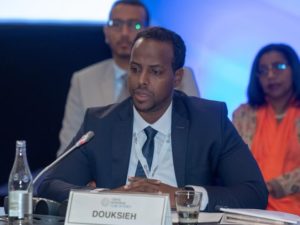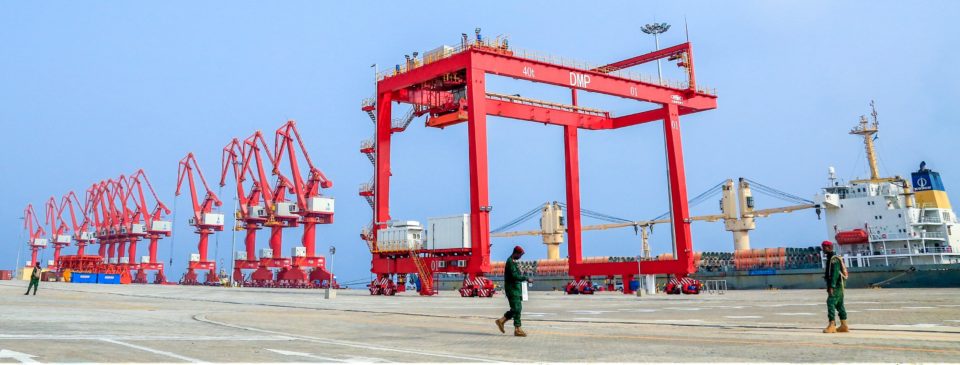
Economy in Djibouti is going through multiple transformations. While a majority of African countries are challenged with loans and cash flow problems, financially well-heeled players are capitalizing on the country’s good business environment.
Early July 2018 when Djibouti launched the continent’s biggest free trade zone at the entrance of The Red Sea, a move that seems to allow foreign companies to set up processing industries and also add value to products available.
Funded by the Chinese government at a cost of $3.5 billion and spanning an area of 4,800 hectares, the Djibouti International Free Trade Zone (DIFTZ), which echoes economic boost for both the country and region at large, will take an approximate of ten years to be completed, and seeks to strengthen the country’s muscle in international trade.
To be precise, the 240 hectares plot phase that was launched last year cost $370 million and consists of four industrial clusters which will focus on trade and logistics, export processing, business and financial support services as well as manufacturing and duty-free merchandise retail.
The project’s strategic location, which is along the 752 km electric rail track linking it to Ethiopia’s capital and subsequently opening it up to the region, ricochet great opportunities.
Aboubaker Omar Hadi, who is the Chairman of Djibouti ports and free zones Authority pointed out during the launch–which also coincided with the Africa-China Economic Forum –, that Djibouti having become a logistics hub, the country would take steps to consolidate its economic diversification and become and industrial and trade African hub.
Rwandan President Robert Kag ame and Somalia’s Mohamed Abdullahi Farmajo were among the top leaders at the launch.
President Kagame acknowledged the regional leaders present and hailed the DIFTZ as a project that was long overdue. It is going to help revolutionize trade in the region. President Farmaajo shared the same sentiments calling the mega project “a victory for Africa”.
According to Freight Hub website, a free trade zone is a geographic area where goods may be landed, stored, handled, manufactured, or reconfigured, and re-exported under specific customs regulations and generally not subject to customs duty.
As always, the case, such zones are expected to stimulate economic growth and are generally found around major seaports, international airports and areas with strong transport ties.
A model example is Singapore, which is a gateway for the AE-SAN Economic Community.
More and more people are celebrating the project thanks to the fact that the benefit to this is job creation. Thousands of locals will be employed in helping bring up the support infrastructure like roads, energy, water and even building thereby lifting economic activity of the tiny African nation.

An estimated 350,000 jobs are will be created in the course of the ten years window that the project will take to completion.
The East African region, whose leaders were notably present stand to benefit too, as it will expand key sectors like food, textiles, packaging and automotive parts.
The launched pilot zone is said to have four industrial clusters focusing on trade, logistics, export processing and distribution.
This project is run by China Merchants Group, Dalian Ports Authority and IZP thanks to backing by Chinese government under the global infrastructure network under China’s ‘Belt and Road’ initiative.
There was also the setting up of a “one stop shop”, which is a tool allowing companies conduct business efficiently as they handle administrative processes like customs clearance, visas, training, business registration and training.
A publication in the Galati Free Zone website lists five important activities that make a free trade zone beneficial. Running it along this DIFTZ clearly shows good planning and if adhered to it will be a massive economic project not just for Djibouti but the region too.
The benefits include production, warehousing, trading of goods, fairs and expositions and transport and forwarding.
FACT BOX
Logistics Industry Cluster: transportation, bonded warehousing, logistics and distribution;
Business Industry Cluster: bulk bonded goods transactions, merchandise display, duty-free merchandise retail; Business Support Cluster: financial services, information services, hotel dormitories, office buildings, training, intermediary services;
Processing Manufacturing Cluster: packaging production, light processing of incoming materials, food processing, marine products, auto parts assembly.
A number of business incentives were proposed that the DIFTZ would offer and they include;
0% corporate income tax, personal income tax for foreign employees.
0% property tax
0% VAT
Employers assume 10.2% social security
Work permit for foreign workers
0% Dividend tax

